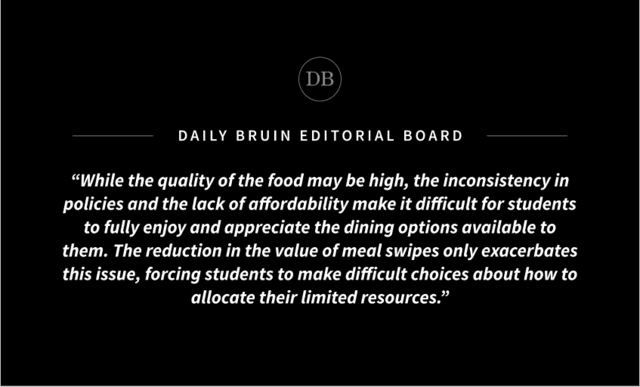Editorial: UCLA Dining must prioritize consistency in students’ dining experiences
By Editorial Board
April 29, 2024 6:35 p.m.
This post was updated April 30 at 8:00 p.m.
One step forward, two steps back.
Since the return of students to campus after the COVID-19 pandemic, UCLA Dining has failed to build upon the momentum of its small wins and ultimately struggled to find its footing.
When the COVID-19 pandemic first started in 2020, approximately 80% of students who lived on the Hill moved out early. For the remainder of the academic year, only two dining halls remained open: De Neve Residential Restaurant and Feast at Rieber. They provided takeout during the breakfast, lunch and dinner hours.
The following academic year remained almost completely remote, with only around 630 students living on campus. They only had access to takeout from De Neve and Bruin Café until March, when limited indoor dining was allowed with consideration of safety measures.
When the campus reopened in fall 2021, students returned – only to be met with staffing shortages and long lines. Many dining halls were initially closed for indoor dining, and both Café 1919 and Bruin Bowl, which opened their doors for just a quarter, shut down because of staffing shortages.
To help alleviate the stress caused by these challenges, UCLA introduced food trucks on campus as a temporary solution. Feast – once a thriving all-you-can-eat dining hall – underwent a transformation during this time, becoming a pop-up kitchen highlighting different guest chefs and restaurants.
Now, about four years after the start of the pandemic, UCLA Dining has had some minor victories. Nevertheless, the department continues to grapple with staffing shortages and struggles to provide a consistent dining experience for residents on the Hill.
The openings of The Drey in fall 2021 and Epicuria at Ackerman during the 2022-2023 academic year along with the reopening of Café 1919 were clear improvements.
They offer students dessert and to-go options, plus easier access to UCLA Dining near their classes.
UCLA Dining also introduced several initiatives to improve the dining experience for students during the current academic year.
The off-campus meal plan pilot aimed to provide more flexibility and options for students living outside the Hill.
Online ordering, via the Transact Mobile Ordering app, also became available for almost all takeout dining options. While the app was meant to help students avoid long lines and wait times, some issues arose when the service was launched.
De Neve Late Night, which offered chicken tenders, burgers and fries last year before its discontinuation due to staffing shortages, has now reopened to offer customizable pizzas.
Similarly, Epicuria at Ackerman now offers croissant sandwiches and calzones in the mornings. Bruin Café has reintroduced its breakfast options, a service that was short-lived during the 2021-2022 academic year.
While these developments are undeniably positive, UCLA Dining must prioritize consistency in its offerings.
Over the past few years, students have been subjected to a chaotic cycle of dining halls opening, closing and then reopening, leaving them little time to adjust to each change before the next one takes place. Compounding this issue, the hours of operation for these dining facilities have fluctuated from quarter to quarter.
When new dining establishments are introduced and closed a quarter later, students undoubtedly have trouble keeping track of UCLA Dining’s offerings, which can lead to less overall usage – no matter how good the options may be.
While UCLA Dining should continue to evaluate its offerings and work to introduce new options, it should simultaneously see the value in stability and focus on maintaining consistent dining options.
These improvements have also been overshadowed by the decision to reduce the value of meal swipes from $9 to a mere $4.33.
With current meal plan prices, Bruins pay approximately $14 per meal via their meal plans, so the monetary value of a swipe already has students paying too much for too little in return. Instead of halving the value of each swipe, UCLA should increase it by at least 50% to provide students with the price they deserve.
In the expensive city of Los Angeles, where the cost of living is on the rise, university meal plans provide students with an affordable way to access healthy, balanced meals. But with the new value of swipes, students will barely be able to afford a large cup of coffee on campus, let alone a full meal.
This decision demonstrates a clear disconnect between the needs of the student body and the priorities of UCLA Dining.
Moreover, the fact that UCLA Dining has been ranked as the best college food in America for several years only adds insult to injury for students who feel that their needs are not being adequately met.
While the quality of the food may be high, the inconsistency in policies and the lack of affordability make it difficult for students to fully enjoy and appreciate the dining options available to them. The reduction in the value of meal swipes only exacerbates this issue, forcing students to make difficult choices about how to allocate their limited resources.
To maintain its No.1 ranking, UCLA Dining must heed student concerns and prioritize consistency, or it risks further alienating already disgruntled Bruins.
